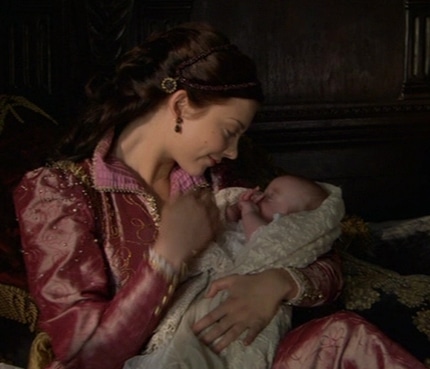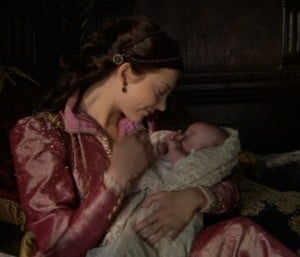Golden World Unto Thy People


In a college theatre history class, our teacher gave a brief synopsis of Henry VIII and his six wives. I was miffed by his rendition of the tale: Catherine of Aragon had a girl, Henry VIII divorced her to marry Anne Boleyn and have a son, but instead Anne had a girl, too! I squirmed in my chair as my fellow students laughed at Anne’s supposed failure. I had to restrain myself from shouting “Do you know who that baby girl turned out to be?” Herein lies the ultimate argument for Anne’s impact on history. If Anne achieved nothing else in her life, giving birth to the future “Virgin Queen” is enough to make her one of the most important figures in history.
There will always be a debate about what Anne Boleyn was really like. Was she the “goggle-eyed wh*re” or the Protestant martyr? Regardless of where one’s personal opinion falls, it is very hard to argue that Anne Boleyn’s life and death did not have an impact on history. Wouldn’t history be awfully different if Anne Boleyn never existed? Would Henry VIII’s ties with Rome still be intact without Anne Boleyn as his rock? Would his legendary number of wives be reduced?
One can argue that Anne was merely at the right (or wrong depending on one’s views!) place at the right time and it was simply a matter of time before Henry VIII found another girl to replace Catherine of Aragon. But it’s hard to argue that any other potential second wife would have produced a daughter as influential as Elizabeth Tudor.
It’s scientific fact that a child inherits 50% of their mother’s and father’s DNA. Elizabeth possessed traits from both of her parents. There’s the argument of nature vs. nurture, but without nature, there’s nothing for “nurture” to cultivate and influence. Anne’s physical presence may not have lasted long in her daughter’s life, but her genetics would forever shape Elizabeth. She was definitely Anne’s daughter. It can be seen physically, intellectually, and emotionally.
Eric Ives describes Anne as having won her way by “education, personality, and courage”. Ives goes on to say that she had “…the light touch of a courtier, yet the strong grip of the politician”. He also describes her as “a woman in her own right–taken on her own terms in a man’s world”. Comparable descriptions have been said of Elizabeth. Historian Charles Beem says “she’s the model of female rule in a male-dominated society. Elizabeth was the master of taking female traits and turning them into successful strategies for leading”. Journalist Lisa Rogers wrote that “ [Elizabeth] was an independent woman in a world dominated by men”. In G. R. Elton’s book, England Under the Tudors, he described Elizabeth’s character as “one of steel, her courage utterly beyond question . . .”
Anne’s influence went beyond genetics. She was insightful and cautious enough to realize that with her position as Queen dangling by a thread she would need to select individuals that she could trust to protect Elizabeth. By doing this, Anne helped guide Elizabeth’s upbringing. Furthermore, the discovery after Elizabeth’s death that her beloved ring contained the miniatures of herself and her mother leaves no doubt that she had a very deep affection for her mother. We will never know the extent of this, but it’s a sign that Elizabeth clearly never forgot her mother’s memory. Anne must have continued to play a role in her life beyond the grave.
Perhaps Elizabeth’s future was foreshadowed during Anne’s coronation. The pageants prepared for Anne Boleyn’s coronation drew much attention to her pregnancy. This was done in an effort to portray Anne as the rightful and legal queen. For how could she not be when she was going to give the King his long sought after heir? During one of the pageants, the Muse of history, Clio, spoke these words in Latin:
Anna comes, the most famous woman in all the world;
Anna comes, the shining incarnation of chastity.
In snow-white litter, just like the goddesses,
Anna the Queen is here, the preservation of your future.
In another coronation pageant, at the feet of the three Sybils at St. Paul’s Gate was the inscription on a scroll, “Queen Anne, when thou shalt bear a new son of the King’s blood, there shall be a golden world unto thy people”. According to these words, one would think Anne failed miserable by giving birth to a girl and not a boy. But in fact, if one replaces the word “son” with child, Anne actually achieved what her excessive coronation pageants promised. Her daughter Elizabeth’s reign is known as England’s “Golden Age”.
Anne was the mother of Queen Elizabeth I and because of this, her impact on history cannot be questioned. History would be extremely altered without Elizabeth. Now that’s not to say Anne didn’t make her own important contributions to history besides Elizabeth. I could write another essay just about her own individual achievements. But it is her daughter, Elizabeth, that is her ultimate vindication. Anne Boleyn’s impact on history is cemented by Elizabeth’s golden reign.
by Hayley Adams
Sources
- Beem, Charles. “Elizabeth I: The Conference Papers.” Charles Beem Tudor Historian. 30 January, 2011
- February 10, 2011.
- Ives, Eric. The Life and Death of Anne Boleyn. Massachusetts: Blackwell, 2005.
- Rogers, Lisa. “An Imperial Intellect: Elizabeth’s Legacy 400 Years Later.” National Endowment for the Humanities. July/August, 2003
- February 10, 2011.